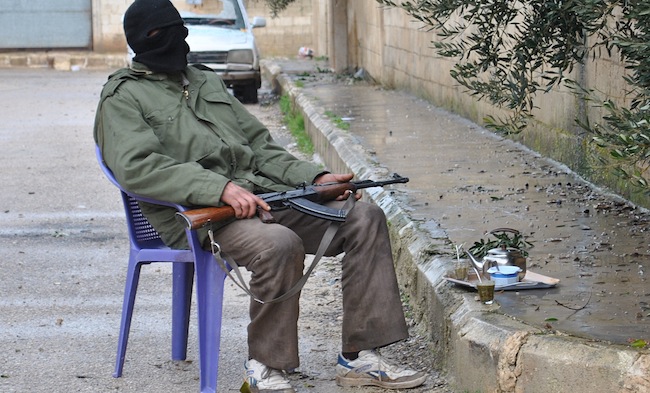Syria still wants that seat on the UN Human Rights Council – Russia, Arabs and China agree
THE Syrian Government has started to use machine guns and tanks to bombard its own people living in the city of Homs.
So. What has the UN done?
The Security Council resolution backed an Arab League call for President Bashar al-Assad to step down. And then Russia and China vetoed it.
Vitaly Churkin, Russia’s ambassador to the UN, told the Security Council that the West was trying to get is own man in power.
Hillary Clinton, the US Secretary of State, thundered:
“What more do we need to know to act decisively in the Security Council?… To block this resolution is to bear responsibility for the horrors that are occurring on the ground in Syria. If we do not begin a process, I know what will happen. Increasing resistance from those whose families have been killed and homes have been bombed; a greater likelihood that Syria will descend into a civil war.”
William Hague, the Foreign Secretary, had said:
“Russia and China faced a simple choice today: would they support the people of Syria and the Arab League or not? They decided not to, and instead sided with the Syrian regime and its brutal suppression of the Syrian people in support of their own national interests. Their approach lets the Syrian people down, and will only encourage President Assad’s brutal regime to increase the killing, as it has done in Homs over the past 24 hours.”
US President Barack Obama trills:
“Any government that brutalises and massacres its people does not deserve to govern.”
Mr Lavrov, the Russian representative, told the UN conference in Munich:
“Peaceful protests are being used by armed groups who use them to make trouble, to attack state institutions. Many facts to this effect have been accumulated and reported by the Arab League mission… We try to stick to our responsibilities as permanent members of the Security Council, and the Security Council by definition does not engage in domestic affairs of member states. When we see a veto, it’s the [UN] Charter at work.”
Ban Ki Moon, the UN Secretary-General, reacted:
“It undermines the role of the United Nations and the international community in this period when the Syrian authorities must hear a unified voice calling for an immediate end to its violence against the Syrian people.”
Alain Juppe, the Foreign Minister, offered:
“The international community must recognise and support the right of the Syrian people to freedom, security and the choice of its political future. Those who block the adoption of such a resolution will bear a heavy responsibility in history.”
What will the UN do?
In 2005, the Times reported that Syria had assassinated killed Rafik Hariri because of his success in pushing Resolution 1559 through the UN Security Council. The UN resolution demanded that Syria stop interfering in Lebanon. US and UN officials repeatedly warned Syria not to harm Mr Hariri in the months before his death. In mid-January, under pressure from Damascus, the Lebanese Government withdrew his 70-strong security detail, and immediately after his death the scene of the bombing was swept to remove any evidence of Syrian complicity.
How could Syria invade three kilometers into any region of Lebanon without triggering a diplomatic and media storm? So I emailed Michael Young, opinion page editor at Beirut’s Daily Star, and asked him if the story was nonsense. “It is true,” he said, “but the problem is that the 3 kilometers are in isolated areas, so that it isn’t making headlines. However, the UN will be discussing border issues this week, I think, and that will be brought up. The Syrians are ratcheting up the pressure, but with the attack against UN troops in the south, they are, as one UN official put it, playing with fire.”
In 2011: When the UN human rights council met to condemn Syria on Friday, Qatar, Bahrain and Jordan did not even turn up to vote: Saudi Arabia abstained and post-revolutionary Egypt asked for amendments to water down the resolution.
And then there was this:
A U.S.-backed European initiative to issue a U.N. Security Council statement condemning Syria’s use of force against civilians ran aground today in the face of opposition from China, Lebanon, and Russia. Last week, ambassadors from the Arab League issued a letter supporting Damascus’s bid for a seat on the Human Rights Council (HRC). The U.N.’s Asia Group had already announced in January its endorsement of Syria’s candidacy for the rights council, and the group plans to push for a vote in the General Assembly next month.
But the bid is already running into fierce criticism.
“Syria’s campaign for a seat on the Human Rights Council is a slap in the face to the victims of the current crackdown, and an embarrassment to those who have supported its candidacy,” said Philippe Bolopion, the U.N. director for Human Rights Watch. “By supporting Syria’s candidacy, the Asian Group and the Arab League risk emboldening Syria’s bloody crackdown and making a mockery of the Human Rights Council.”
And which enlightened champion of human rights does Syria want to replace on the UN Human Rights Council? Yep…Libya!
The United Nations. What’s the point of it?
12644141
Image 2 of 14In this photo taken during a government-organized tour for the media, Sister Verona, head of the Sednaya Covent, shows journalists a damaged room which was attacked by artillery fire Sunday in Sednaya, north of Damascus, Syria, Tuesday, Jan. 31, 2012. No casualties were reported in the attack, which the Syrian government blamed on "armed terrorists." A senior Russian diplomat warned Tuesday that a draft U.N. resolution demanding Syrian President Bashar Assad step aside is a "path to civil war," as Syrian troops crushed pockets of resistance by rebel soldiers on the outskirts of Damascus. (AP Photo/Bassem Tellawi)
Posted: 4th, February 2012 | In: Reviews Comment | TrackBack | Permalink




